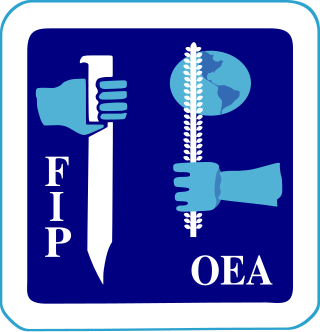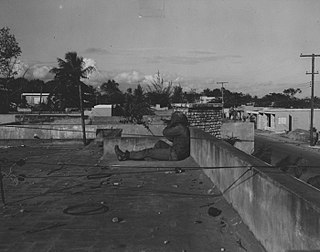
Politics of Honduras takes place in a framework of a multi-party system presidential representative democratic republic. The President of Honduras is both head of state and head of government. Executive power is exercised by the government. Legislative power is vested in the National Congress of Honduras. The party system is dominated by the conservative National Party of Honduras, the Liberal Party of Honduras, and Liberty and Refoundation.

The Organization of American States is an international organization founded on 30 April 1948 to promote cooperation among its member states within the Americas.

The Inter-American Treaty of Reciprocal Assistance is an intergovernmental collective security agreement signed in 1947 in Rio de Janeiro at a meeting of the American states.

José Manuel Zelaya Rosales is a Honduran politician who served as the 35th president of Honduras from 2006 until his forcible removal in the 2009 coup d'état, and who since January 2022 serves as the first first gentleman of Honduras since 2022. He is the eldest son of a wealthy businessman, and inherited his father's nickname "Mel". Before entering politics he was involved in his family's logging and timber businesses.
A mara is a form of gang originating in the United States, which spread to Central American countries such as El Salvador, Honduras and Guatemala.

The Inter-American Peace Force (IAPF) was a peacekeeping force in the Dominican Republic from several countries from the Americas that was formed towards the end of the Dominican Civil War. It was established by the Organization of American States (OAS) on 23 May 1965 following the United States' initial intervention in the war. Brazil later assumed command from the United States in 1966 and in 1967, the IAPF was ultimately disbanded.

Crime and violence affect the lives of millions of people in Latin America. Some consider social inequality to be a major contributing factor to levels of violence in Latin America, where the state fails to prevent crime and organized crime takes over State control in areas where the State is unable to assist the society such as in impoverished communities. In the years following the transitions from authoritarianism to democracy, crime and violence have become major problems in Latin America. The region experienced more than 2.5 million murders between 2000 and 2017. Several studies indicated the existence of an epidemic in the region; the Pan American Health Organization called violence in Latin America "the social pandemic of the 20th century." Apart from the direct human cost, the rise in crime and violence has imposed significant social costs and has made much more difficult the processes of economic and social development, democratic consolidation and regional integration in the Americas.

The Mérida Initiative, also called Plan Mexico, was a security cooperation agreement among the United States, the government of Mexico, and the countries of Central America, that ran from from 2007 to 2021. With the declared aim of combating the threats of drug trafficking, transnational organized crime and money laundering, assistance between the countries included training, equipment and intelligence.
The Pan American Development Foundation (PADF) is a non-governmental and non-political organization created in 1962 by the Organization of American States (OAS), the public sector and the private sector to focus on issues of pressing concern in the Western Hemisphere. PADF, a non-profit organization, has worked in every country in the region. PADF aims to bring together stakeholders to create sustainable economic development, strengthen civil society and respond to natural disasters for the most disadvantaged people in Latin America and the Caribbean.

The 2009 Honduran constitutional crisis was a political dispute over plans to either rewrite the Constitution of Honduras or write a new one.
International reaction to the 2009 Honduran coup d'état of June 28, 2009, was that the coup was widely repudiated around the globe. The United Nations, every other country in the Western Hemisphere and others, publicly condemned the military-led 2009 Honduran coup d'état and ouster of Honduran President Manuel Zelaya as illegal and most labelled it a coup d'état. The Obama administration, along with all other governments in the hemisphere, branded the action a "coup." Every country in the region, except the United States, withdrew their ambassadors from Honduras. All ambassadors of the European Union were recalled. Venezuela said it would suspend oil shipments, and Honduras's neighbors — El Salvador, Guatemala and Nicaragua - stopped overland trade for 48 hours. The World Bank and Inter-American Development Bank suspended lending to Honduras.
The 2009 Honduran constitutional crisis was a political confrontation concerning the events that led to, included, and followed the 2009 Honduran coup d'état and the political breakdown associated with it. The coup was repudiated around the globe, but Roberto Micheletti, head of the government installed after the coup, has claimed that the Honduran Supreme Court ordered the detention of Manuel Zelaya, deposed President of Honduras, and that the following succession was constitutionally valid.

The 2009 Honduran coup d'état, which took place during the 2009 Honduran constitutional crisis, occurred when President Manuel Zelaya failed to follow the Honduran Supreme Court ruling. On 28 June 2009, the Honduran Army ousted him and sent him into exile. Zelaya had attempted to schedule a non-binding poll to hold a referendum on convening a constituent assembly for writing a new constitution. Despite court orders to cease, Zelaya refused to comply, and the Honduran Supreme Court issued a secret arrest warrant dated 26 June. Two days later, Honduran soldiers stormed the president's house in the middle of the night, detained him, and thwarted the poll. Instead of putting him on trial, the army put him on a military plane and flew him to Costa Rica. Later that day, after reading a resignation letter of disputed authenticity, the Honduran Congress voted to remove Zelaya from office and appointed Head of Congress Roberto Micheletti, his constitutional successor, to complete his term. This was the first coup to occur in the country since 1978.
Crime in Honduras has become a growing matter of concern for the Honduran population in recent years. Honduras has experienced alarmingly high levels of violence and criminal activity, with homicide rates reaching a peak in 2012, averaging 20 homicides per day. Corruption, extortion, coercion, and drug smuggling also run rampant throughout Honduran society, preventing the nation from building trustworthy authorities like police, and severely limiting economic, social, or political progress. The situation has prompted international organizations and governments to offer assistance in combating crime in Honduras.

Adam E. Namm was appointed the Executive Secretary of the Inter-American Drug Abuse Control Commission (CICAD) of the Organization of American States (OAS) on December 1, 2016, following a 30-year career in the U.S. diplomatic service, including serving as U.S. Ambassador to Ecuador from 2012 to 2015.

Luis Leonardo Almagro Lemes is a Uruguayan lawyer, diplomat, and politician who currently serves as the 10th Secretary General of the Organization of American States (OAS) since 2015. A former member of the Broad Front, Almagro served as Minister of Foreign Relations of Uruguay from 2010 to 2015 under president José Mujica.
The secretariat for multidimensional security of the Organization of American States is a part of the General Secretariat, which is headquartered in Washington, D.C., United States. The Secretariat for Multidimensional Security has a mandate to promote cooperation between Organization's Member States, Inter-American and international organizations, as well as with entities such as the United Nations and its subsidiaries, in order to analyze, prevent, confront and respond to security threats.
The Truth and Reconciliation Commission in Honduras began its work on May 4, 2010 and submitted a final report in July 2011. The commission was created due to its inclusion as one of the measures in the “Accord for National Reconciliation and the Strengthening of Democracy in Honduras".

Flavio Darío Espinal is a Dominican jurist, political scientist, diplomat and academic. He was the legal advisor to the President of the Dominican Republic from 2016 to 2020.

The Mission of the Representative of the Secretary-General in the Dominican Republic (DOMREP) was a peacekeeping operation established in 1965 by the UN to observe the ceasefire agreement between the two de facto authorities in the Dominican Republic during the Dominican Civil War. DOMREP was instructed to report any breaches of the agreements between the Constitutionalists led by Juan Bosch and Francisco Caamaño, and Loyalists commanded by Elías Wessin y Wessin and backed by the United States. Once the new Dominican constitutional government was formed, DOMREP withdrew.










